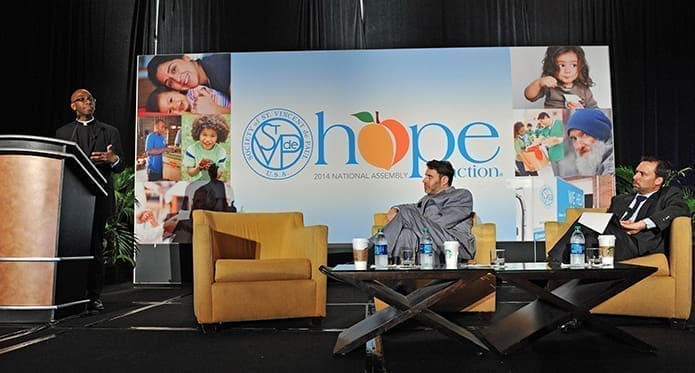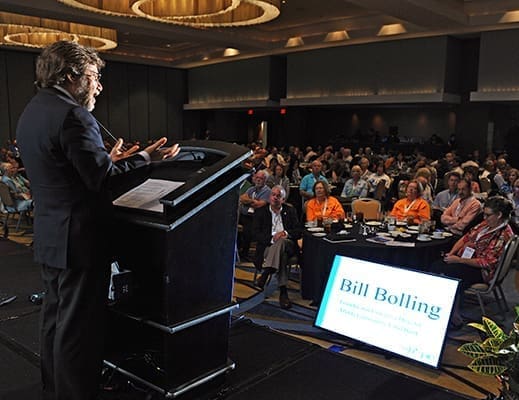 Photo By Lee Depkin
Photo By Lee DepkinAtlanta
St. Vincent de Paul creates more shared ‘tables’ with the poor, Atlanta Food Bank director says
By ERIKA ANDERSON, Special to the Bulletin | Published October 2, 2014
ATLANTA—They came from different states. They spanned a wide range of ages. Their backgrounds were varied. But all who gathered for the 2014 Society of St. Vincent de Paul National Assembly at the Marriott Marquis Sept. 24 to 27 shared one common mission—to learn how to better serve those who most need their help.
More than 750 Vincentians—the largest turnout in more than 13 years—attended the annual assembly, coming from as far away as Puerto Rico. The conference featured workshops, committee meetings, and national and local keynote speakers.
On Saturday, Sept. 27, Bill Bolling, executive director of the Atlanta Community Food Bank, offered the keynote speech during lunch. Since Bolling founded the food bank in 1979, the organization has grown to distribute more than 50 million pounds of food and grocery products each year through a network of 600 local and regional partner nonprofit organizations that feed the hungry across 29 Georgia counties.
In his talk, Bolling spoke of the importance of the table. Even in Scripture, many of the stories of Jesus take place around a table. Feeding those in need is about more than just food, he said.
“The table was the place to be with people. For me, more important than doing for people was to be with people,” he said. “The idea of starting a food bank was to have more of those tables—more of those places where we would meet to be with each other. To listen—to really find out more deeply what those issues were.”
Bolling said it’s important to change the public mindset about people in need.
“There’s this idea that if you’re poor, you must be a bad person. If you’re poor, you must be a bad parent. If you’re poor, you must be lazy and not want to work. Do you know that more than 50 percent of the people who come to us and need food are people who are working?” he said. “If you’re getting up every day and going to work and you’re keeping your end of the social contract, but you’re still not able to put food on the table, there’s something wrong with that.”
Above all, Bolling said, it is critical to treat the poor with respect.
“St. Vincent de Paul has always been a safe, welcoming place. St. Vincent de Paul has treated people with dignity. You have done the work of being with, not just for. You’ve been conscious that we don’t know when we’re going to be serving Jesus, or when Jesus is going to be walking in that door, or if Jesus is going to be hungry or depressed or out of a job,” he said. “We don’t know who’s going to walk through that door, but we’re called to serve.”
“Each of you represents hope—hope born of action, hope born of faithfulness, hope born of being at the table and being with and not just doing for,” he said.
When it comes to sustaining the work of St. Vincent de Paul or the food bank, Bolling said that the great disease in America is cynicism.
“The opposite of cynicism is not optimism,” Bolling said. “To counter cynicism in the world is to take action.”
“We’re all called to do what we can with what we have in the time we have,” he said. “St. Vincent de Paul today represents our legacy. St. Vincent de Paul tomorrow will be the legacy of the next generation, which we’ve got to invite.”
Christian vision of those in need
Later Saturday, a panel discussion about the biblical roots of social justice featured Father Desmond Drummer, parochial vicar at St. Peter Chanel Church, Roswell, Rabbi Peter Berg, senior rabbi of The Temple, in Atlanta, and Doug Shipman, chief executive officer of the National Center for Civil and Human Rights, which just opened in Atlanta.
Father Drummer, who was ordained in June, spoke of his experiences as a global fellow with Catholic Relief Services. As a seminarian, he spoke at various Catholic schools about the need to care for the poor. He recalled one student, who, when Father Drummer asked the class why there is poverty, replied that people are poor because they want to be poor. When Father Drummer asked why he thought that, the student replied that that was what his parents said.
“What are we teaching our children? What type of vision of Christian witness are we handing on to them?” he asked.
Father Drummer said he was once cautioned against speaking too much about CRS because many disagree with the vision of the global organization.
“I was speechless. What are we doing? Why is it so difficult to call our brothers and sisters to prayerful awareness about the needs of our brothers and sisters around the world and especially in our own neighborhoods?” he asked.
“Contempt for the poor remains the primary attitudinal obstacle preventing further developments in addressing the problem of domestic poverty. Far more than greed or selfishness, contempt for the poor is a disposition that causes far too many in our tradition to be hesitant in supporting charitable works, advocating for poverty-alleviating public policies, and participating in Christian action to serve those in need,” the priest said.
Father Drummer said contempt for the poor is borne out of a society that worships money. But Scripture says that God is invested in those who are in need.

Bill Bolling, executive director of the Atlanta Community Food Bank, gives the keynote address at the Saturday luncheon of the 2014 National Assembly of the St. Vincent de Paul Society Sept. 27. Photo By Lee Depkin
“Who is really at risk at missing out on the kingdom? Those whose hope is in the accumulation of material goods and social status? These are the people who will miss out on the kingdom,” he said. “I don’t see anything where the poor are particularly at risk for their moral depravity and their neediness of missing out on the kingdom of God. The kingdom of God is oriented for their good.”
Rabbi Berg spoke of the battle against “compassion fatigue.”
“We just can’t repair the whole world, so we can’t worry about every single needy soul, every natural disaster, every illiterate American, every person who goes to bed hungry,” he said. “The mind staggers in the face of the task of redemption that lies before us, and feeling overwhelmed, we develop a weariness, a desire just to shut the world out and instead focus on ourselves.”
But this is not an excuse, he said.
“To be Jewish, to be Catholic, to be religious, is to say yes to God. It is to be God’s partner in ending compassion fatigue. Because there is much we can say yes to this year. Each and every one of us here has within us the God-given spark of creativity, the ability to transcend, to bring order out of chaos, to bring beauty out of ugliness,” Rabbi Berg said.
The panel continued with questions and answers and deep discussion about caring for the poor.
Serving while offering dignity
For many of those who attended the conference, the gathering was an opportunity to learn from other Vincentians.
Cheryle Horan, a Vincentian from St. Augustine, Florida, became Catholic in 2008 and has only been involved with the society for a year.
“I’ve always felt a call to serve the poor. I’ve always been interested in their stories. I thought I was poor when I was growing up until I met an actual poor person, and then I realized I’m actually quite blessed,” she said. “Serving with St. Vincent de Paul, you really get to know people. You get to know their stories. And you take away so much more than you give.”
Throughout the week, there were discussions about getting young people involved in SVdP. A group who attended from St. John’s University in Queens, New York, said it’s about showing their peers the importance of what they do.
“The Vincentians have a unique way of doing service that really offers dignity to the people we serve and shows we’re all equal. That’s what attracts me to the work,” said Chris Pallucio, 19.
His fellow student, Shana Joseph, 19, said serving with St. Vincent de Paul allows them to connect on a deeper level.
“Being a part of St. Vincent de Paul makes you a family. And the way to carry out the mission of our family is in serving others,” she said. “We’re really forming a community. Sometimes people are a little hesitant to get involved, but after their first experience, they fall in love.”
John Berry, chief executive officer of St. Vincent de Paul Georgia, said the assembly was a chance to show other Vincentians the important work that members are doing throughout the state.
“We were able to highlight much of St. Vincent de Paul Georgia’s work, and hopefully provided both inspiration and practical guidance for other SVdP organizations around the country,” he said. “We also were able to demonstrate and highlight the great level of support and help we get from the archdiocese. Atlanta has the third highest percentage of parishes with SVdP conferences in the U.S.—88 percent. And with the help and support of the archdiocese, we’re working hard to make that 100 percent.”
Editor’s Note: This story includes a corrected figure of 50 million pounds of food and grocery products a year as the annual amount distributed through the Atlanta Community Food Bank and its partners. The print edition of The Georgia Bulletin did not have the most recent figure.